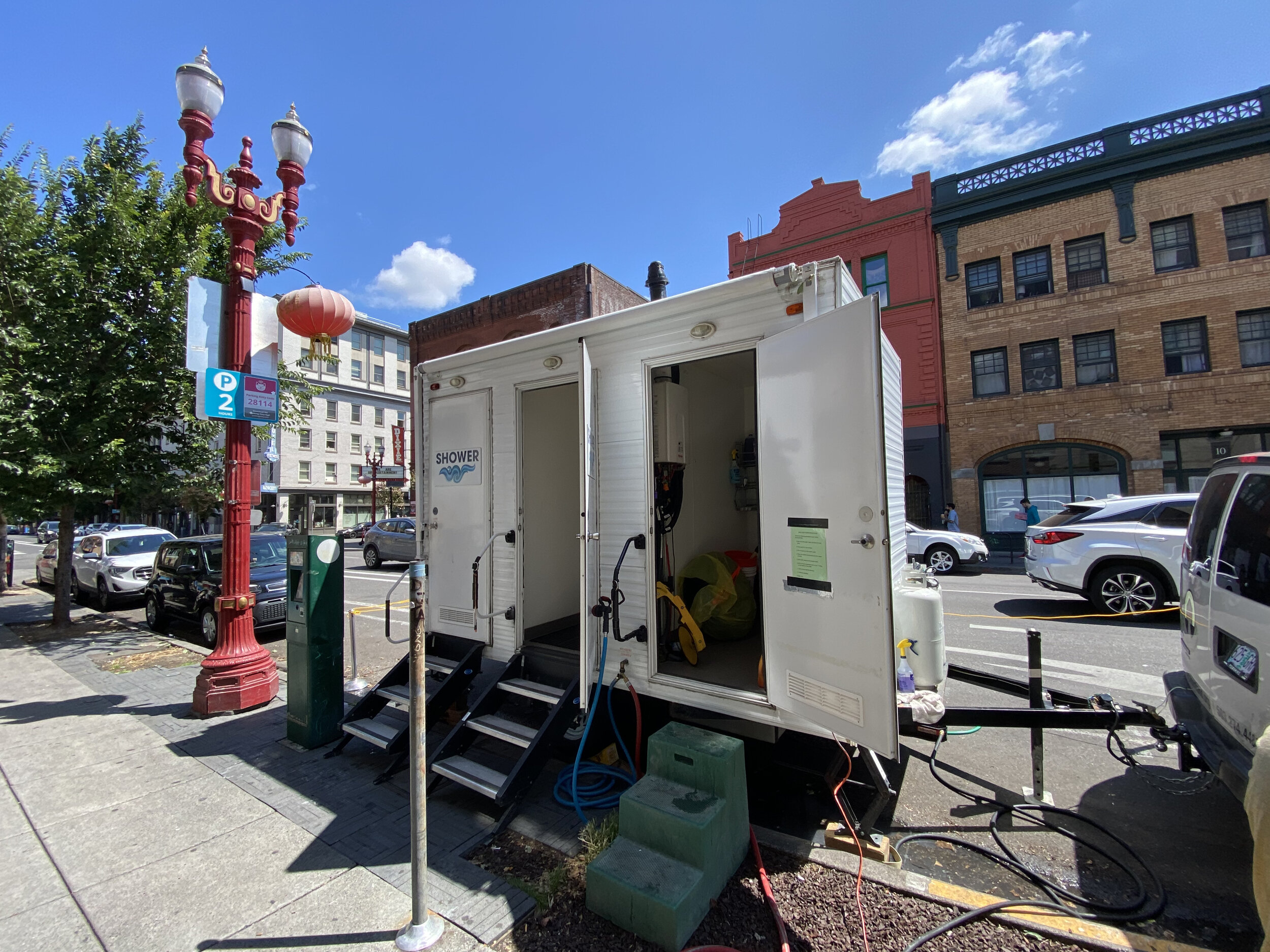
Our Impact
Portable hygiene unit on the streets of downtown Portland. Photo credit: Sean Green
What We’ve Accomplished So Far
As a volunteer led effort that launched in mid-2020, we’ve already influenced the momentum on this issue and achieved significant impacts, including:
Co-founding and supporting the independent Lived Experience Council of Multnomah County–made up of 100% people with living and lived experience of homelessness–who are building community and collectively engaging policy makers on their concerns and priorities, such as the need for low-barrier job opportunities, as well as planning for a “secret shopper” pilot to partner with providers to help improve service quality and impact.
Ensuring the voices of people who are houseless are included in key policy and budget decisions
Advancing understanding of and progress on implementation of Built for Zero, a system for disciplined action, collaboration, and continuous improvement, that has been utilized to drive effective use of public funds to end unsheltered houselessness (like other U.S. communities have achieved)
Raising more than $700,000 through a collaborative federal grant to support five grassroots organizations (Voz, Portland Street Medicine, Agape Village, Rahab’s Sisters and Hygiene for All) providing alternative shelter options and services to people experiencing houselessness
Organizing Community Forums of up to 180 people to connect people and learn about models and best practices in responding to the needs of the homeless community
Co-facilitating and supporting the Alternative Shelter Network–designers, builders, and operators of alternative shelters and related service providers–helping secure JOHS funding support ($250,000) and convene to share knowledge and resources to bring quality, diverse options online more efficiently
Co-authoring published opinion pieces and taking other advocacy actions to ensure an inclusive, community-centered JOHS Director hiring process that prioritized a visionary leader who would bring our region together to collaboratively build a cohesive system-level strategy
Building positive relationships with City, County, and Metro policy-makers and key partners to educate, engage, and influence them around alternative shelter, Built for Zero, and other strategies
Providing key testimony in the annual budgeting process, helping shape investments and dramatically increase city funding for a range of alternative shelter options and supportive services that meet diverse needs
Participating on multiple city and county committees related to houselessness, and as such, playing an increasing role in decision-making and implementation of policy and investments
Engaging with people who hold different perspectives to support understanding and build bridges to foster a more collaborative culture (e.g. HereTogether dinner series)
Majority of our leadership team participating in Multnomah County’s Point-in-Time Count, and providing feedback and recommendations
Articulating and elevating the need for system improvements
Establishing Shelter Now as an independent 501(c)(3) nonprofit (previously fiscally sponsored by the Northeast Coalition of Neighborhoods) to increase our credibility, raise our profile, and strengthen our capacity to influence change
Providing critical input and accountability, and helping shape the Shelter to Housing Continuum (S2HC) and Metro SHS Implementation Plan which passed in April and May of 2021
Testimonials for Shelter Now
Dan Ryan, Portland City Councilor:
“I have sincerely valued the voice of this emerging organization be a part of the conversation. Too often, input is limited to governmental leaders and service providers.
“[Shelter Now] cares about results, not contracts. This brings both an approach that is humane and compassionate, along with the perspectives of the larger community.
“[Shelter Now] does not pretend to have a silver bullet that would solve this crisis. Instead, as a responsible advocacy organization, the volunteer members are willing to roll up their sleeves and work hard, over time, with a variety of diverse partners to craft viable options for consideration.
This organization is now and can continue to be a valuable, credible asset to us in this city. At the same time, for such a group to sustain and strengthen its advocacy and other work, it clearly needs some financial assistance to help fund essential supportive services. We and the larger community will all benefit from such help for [Shelter Now].”
NorthWest Pilot Project:
“[Shelter Now] is contributing ideas and perspectives through its advocacy work that have been missing from the conversations about housing and homelessness. They approach the work with acknowledgment of the need for collaboration, the importance of necessary infrastructure, and the necessity to strategically focus on BIPOC and other vulnerable populations. With the housing crises we face, all ideas should be on the table for consideration as solutions.”
Street Roots:
“It is exciting to see how the network has evolved since then, based on the work of volunteers. Because one of the barriers to stability for unhoused people is the opposition of housed neighbors, this effort in building solidarity is extraordinarily important. This network is uplifting compassion of housed neighbors. It also supports their unhoused neighbors, who have a voice in this work. That’s too often not the case in projects, and I’m confident in the commitment to inclusion exhibited by [Shelter Now]. Several Street Roots vendors have participated with this Forum, and we are committed to continuing to provide those pathways.”
Testimonials for Lived Experience Council
Mo:
The Lived Experience Council provides an opportunity for networking both among people and with other organizations such as Cultivate Initiatives and Groundscore Association. This networking helps channel people towards growth. We support each other and strive to get better every day.
A lot of us have different lived experiences that we can use to help others by improving the system and providing peer support. We are working to make it easier for people to access resources and peer education is a big part of the work we are doing.
Getting [more support] would help us reach more people and in turn help us support more people and bettering our community.
Derek:
The Lived Experience Council was the first group that helped me get out of my shell. I didn’t talk to anyone for a year and a half until I found this group. I was out there on the streets, but I never interacted with people until I found out about this group from a flyer.
The Council is a safe place where I know I am welcome. This is a place where I can contribute to moving things forward in our community. We are trying to build something, a group of people that are equals and support each other. The TPI shelter where I am staying is so structured that you don’t feel like you have a say.
[Getting more financial support] is important to supporting a safe place where people can build community. Often when people are using drugs, the support system is other people who use drugs. When people are ready to better themselves, it is important to have a community that can support you with those goals.
Gwyn:
The Lived Experience Council has given me a space to find my voice, to speak up, and to get my needs met to find housing. We were going through a lot at the shelter when we joined this group and this group supported me to get housed.
I was also appointed to the lived experience advisory committee for the Joint Office of Homeless Services (JOHS). The two groups are very different. Our group is not hand-picked and we all have an equal say in what is being discussed. At the JOHS committee, I don’t feel like it is my group. It feels like it is being run by the staff.
At the Lived Experience Council we all have a say on how to support each other and how we are going to do advocacy. At JOHS committee, I feel like I’m being told what to do.
When I was at the Do Good Multnomah shelter, I felt treated like a child.
Receiving [more support] would be able to help us get more people and open up a lot of pathways and opportunities for those in need. It would help us make the group be more successful for people. We all carry knowledge to support each other while traversing the services and processes.
Dan:
Not everyone has good intentions. The Lived Experience Council is such a great opportunity to connect with people who have lived experience. We share decision making authority and work to change policies that prevent people from furthering their life. We have people with first hand experience about situations where policies do not incentivize people to better themselves because they would lose essential support. We hope to work to change these policies so people get the support they need to better themselves.
